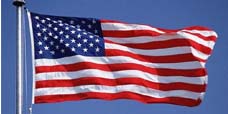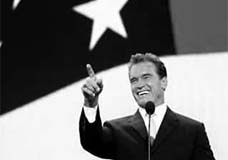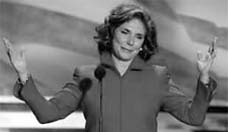
Opting against a traditional career in medicine, Mae Jemison joined the U.S. Peace Corps as a medical officer in Sierra Leone and Liberia. I ask her if this has had any effect on her desire to serve others. Intriguingly enough, she bristles: "I don't believe in altruism. I've gotten much more out of what I have done than the people I was supposed to be helping. When I was in the refugee camp in Thailand, I learned more about medicine there than I could have in a lifetime somewhere else. I refuse to think those people owe me any thanks. I got a lot out of it."
Shooting for the moon - scientist and astronaut Mae C. Jemison - Interview
Essence, April, 1993 by Nikki Giovanni
new
Save a personal copy of this article and quickly find it again with Furl.net. Get started now. (It's free.)
I wrote that poem, "Ego Tripping," more than 20 years ago. And now I'm so proud that on September 12, 1992, Dr. Mae Carol Jemison made history by flying higher than any bird in the sky. As the first Black woman astronaut, she rode the shuttle Endeavour into the space around Earth as a science-mission specialist.
I'm a space nut. I remember thinking when Sputnik I took off in 1957 that now We are Earthlings. I've also been a Trekkie, since the television series Star Trek began. I was intrigued that a sister, Nichelle Nichols, was Uhura, the communications director. It was so right, it made such sense that the voice of The Federation would be the voice of a Black woman. Toni Morrison writes in Tar Baby, "The Black woman is both a ship and a safe harbor." Lieutenant Uhura proved that. So, while I was glad to see America's first woman astronaut, Sally Ride, go above the atmosphere, I knew what was actually needed was a Black woman: Mae C. Jemison.
I am at breakfast with Mae Jemison. I am, naturally, nervous. I am a middle-aged, cigarette-smoking, unhealthy and uninterested-in-health poet who has just snagged the opportunity of a lifetime. I get to interview Mae Jemison.
I would have liked her even if she hadn't said my smoke wouldn't bother her; I would have liked her even if she hadn't said, "oh, i didn't get straight A's in school like my sister," with a devilish smile, "because I took subjects I was interested in." I would have liked her had she been arrogant and impatient with a poet whose view of space is meta-physical, not physical; however, she was not only patient but also kind.
"Aren't you bored a lot?" I am compelled to ask. I mean, she sits talking to people who haven't a hoot in hell what she actually does or can do. "friend once told me: If you are bored, you're not paying attention. I think he's right," she said
Over breakfast, Jemison tells me this story: "When I came home for Christmas, my first year at Stanford University, I brought my calculus with me. My mother said, |Why don't you ask your father to help you?' I thought she couldn't be serious. My father is a high-school graduate, and I was this, well, hotshot at Stanford. But I did ask him for help, and he made it so clear to me. That one thing changed the way I thought about my father and myself."
There is something about Alabama men and numbers. My father, like hers, was a mathematical whiz, and like hers was from a little city outside Mobile. My mother, like Jemison's, also taught school. But I grew up in Cincinnati, and Jemison's hometown is Chicago.
"You know what my mother told me one day?" Jemison asks. "I was feeling really good about some project I had finished, and she just sort of looked at me and said, |But you're illiterate.' I was crushed. How could my mother consider me illiterate?" Jemison laughs and shakes her head. She was so upset that she set out to learn more about Black literature and history. Her undergraduate double degree at Stanford was in chemical engineering and African and African-American studies.
"But what made you decide to go to medical school after undergraduate?" I ask her. "Well," she ponders, "I could have gone into dance, which I love, or I could have gone to medical school. I just chose medical school." There is something wonderful about the way Mae phrases her choices. They are, well, logical. She doesn't feel special, just prepared to control her options.
Opting against a traditional career in medicine, Jemison joined the U.S. Peace Corps as a medical officer in Sierra Leone and Liberia. I ask her if this has had any effect on her desire to serve others. Intriguingly enough, she bristles: "I don't believe in altruism. I've gotten much more out of what I have done than the people I was supposed to be helping. When I was in the refugee camp in Thailand, I learned more about medicine there than I could have in a lifetime somewhere else. I refuse to think those people owe me any thanks. I got a lot out of it."
After leaving the Peace Corps, she was a general practitioner and attending graduate engineering classes in Los Angeles when she was tapped by NASA in 1985. There have been four other Black women astronauts in training with her, but now she is the only one. Until her next flight, which is unscheduled, Mae spends her workdays earthbound at NASA in Houston doing scientific experiments.
It was her task on the shuttle to perform an experiment with frogs. "We wanted to know," Jemison says, "how the tadpoles would develop in space with no gravity. I hatched the eggs and developed the tadpoles. They showed no ill effects, and because frogs, like other life forms, take so much of their basic knowledge from their environment, we were curious if they would hear well, if they would turn out to be ... well, normal frogs. When we got back to Earth the tadpoles were right on track, and they have turned into frogs.
What are your first thoughts when you're whirling in space? "The first thing I saw was Chicago. I looked out the window and there it was," she says, and adds that she also saw all of Earth. "I looked over at one point, and there was Somalia." She was in space while others were in the last throes of starvation.
"Space is so meaningful to Earth," Jemison says. "The Third World will be the ultimate beneficiary of space technology because we're moving away from infrastructures." You don't need to lay telephone wire to have phones anymore; that's what cellular is all about. We don't need old-fashioned generators for electrical connections anymore. The Third World will be able to jump over the Industrial Age into the Space Age. It surprises Jemison that there aren't more people of African descent excited about space and its technology.
"You know what I took with me when I went up?" I do know, but I let her say it. "An Alvin Ailey American Dance Theater poster, an Alpha Kappa Alpha banner, a flag that had flown over the Organization of African Unity, and proclamations from Chicago's DuSable Museum of African-American History and the Chicago public-school system. I wanted everyone to know that space belongs to all of us. There is science in dance and art in science. It belongs to everyone. I'm not the first or the only African-American woman who had the skills and the talent to become an astronaut. I had the opportunity. All people have produced scientists and astronomers." And though she bristles at being seen as an altruist, clearly all her interests are of service to humankind.
Was she afraid? "You are aware that you're on a controlled explosion," Jemison says, "but I have confidence in NASA." Also, you have to think whatever Mae Jemison knows about fear was left in her mother's kitchen.
We use "genius" very lightly. For example, in the movie Sneakers, the nerd had a license plate that said 180 IQ. And I knew Olympic skater Debi Thomas would not prevail when I saw that her license plate said SKTG4AU (Skating for Gold). It was too much pressure. But Mae Jemison is a mind in motion. If that devilish grin and those piercing eyes could be stripped away, I think you would find pure energy in constant motion. Jemison is enjoying her life and its opportunities. Single, 36 and living in the home she bought in suburban Houston, she loves the music of Etta James, and she talks as easily to children as to scientists. She's comfortable with herself.
What's next? If she could design her ideal space trip, what would it be? Her answer: "Me in a clear bubble floating through the galaxy . . . shooting for the moon." Who would she want to go with her? "Sneeze, my cat. I think I'd like to have Sneeze. He came with me from Africa, so he's used to flying. Then," she says with that grin again, if some aliens came by and invited me to another galaxy -- well, look for me on Unsolved Mysteries. I'm gone.
COPYRIGHT 1993 Essence Communications, Inc.
COPYRIGHT 2004 Gale Group





